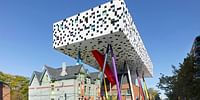- Life science is made up of dynamic fields ranging from molecular biology, genetics, and biotechnology, to comparative physiology, neurology, and health science, to paleontology, ecology, evolution, and extending to biomedical communications.
- UTM's small campus setting allows students to learn in small class sizes (fewer than 35 students in some cases) and get to know their professors.
- Life sciences students will learn to apply methods of scientific inquiry to study the laws and processes of living matter.
- The study of life sciences (including health sciences and psychology) helps students to understand and analyze the behaviour of the human body and those of other organisms.
- It prepares students for ethical, social, and political questions arising from the increasing ability to protect the delicate and complex ecological balance that sustains the world.
HK$63,962/Yr
HK$63,962 /Yr
Important Dates
| Event | End Date |
| Application Deadline | Jan 12, 2024 |
| Deadline To Submit Supporting Documents | Feb 1, 2024 |
Fees & Funding
Tution & Application Fees
| Year | Year 1 | Year 2 | Year 3 | Year 4 |
| Tuition Fees | HK$59320 | HK$59320 | HK$59320 | HK$59320 |
| Health Insurance | HK$756 | HK$756 | HK$756 | HK$756 |
| Books and supply | HK$2000 | HK$2000 | HK$2000 | HK$2000 |
| Miscellaneous expenses | HK$1886 | HK$1886 | HK$1886 | HK$1886 |
| Total Fees | HK$63962 | HK$63962 | HK$63962 | HK$63962 |
Living Costs
| Head | Avg Cost Per Year |
| Housing | HK$3710 |
| Food | HK$2775 |
| Transportation | HK$980 |
Eligibility & Entry Requirement
Academic Eligibility:
- Eligible applicants are selected on the basis of previous academic achievement (the average of their six highest senior-level credits, including required courses).
- Students must have completed at least 4.0 FCEs and achieved a minimum grade of 70%.
- Ontario Secondary School Diploma Six 4U(University)/M(University/College) courses, including:
- Calculus and Vectors
- English
- Students completed the English with a grade of 12 and 65% higher.
- Students must be qualified in IELTS or TOEFL and PTE.
English-Language Proficiency Eligibility:
Successful completion of one of the following is sufficient to demonstrate English-language proficiency:
- At least one or two years of study in English at a recognized university/college.
- A one-year post-graduate certificate at a recognized college in English.
Transfer Credits:
- The CGPA must meet the cut off in a minimum of 4.0 credits taken at the University of Toronto.
- The combined CGPA of all courses taken at another institution plus the University of Toronto courses must meet the minimum cut off for the year in which student is applying.
Scores Required
Ask your question
Similar Colleges You Might Be Interested In
- Similar Colleges
No Ratings Found!!
Follow
No Ratings Found!!
Follow
No Ratings Found!!
Follow
No Ratings Found!!
Follow
No Ratings Found!!
Follow











